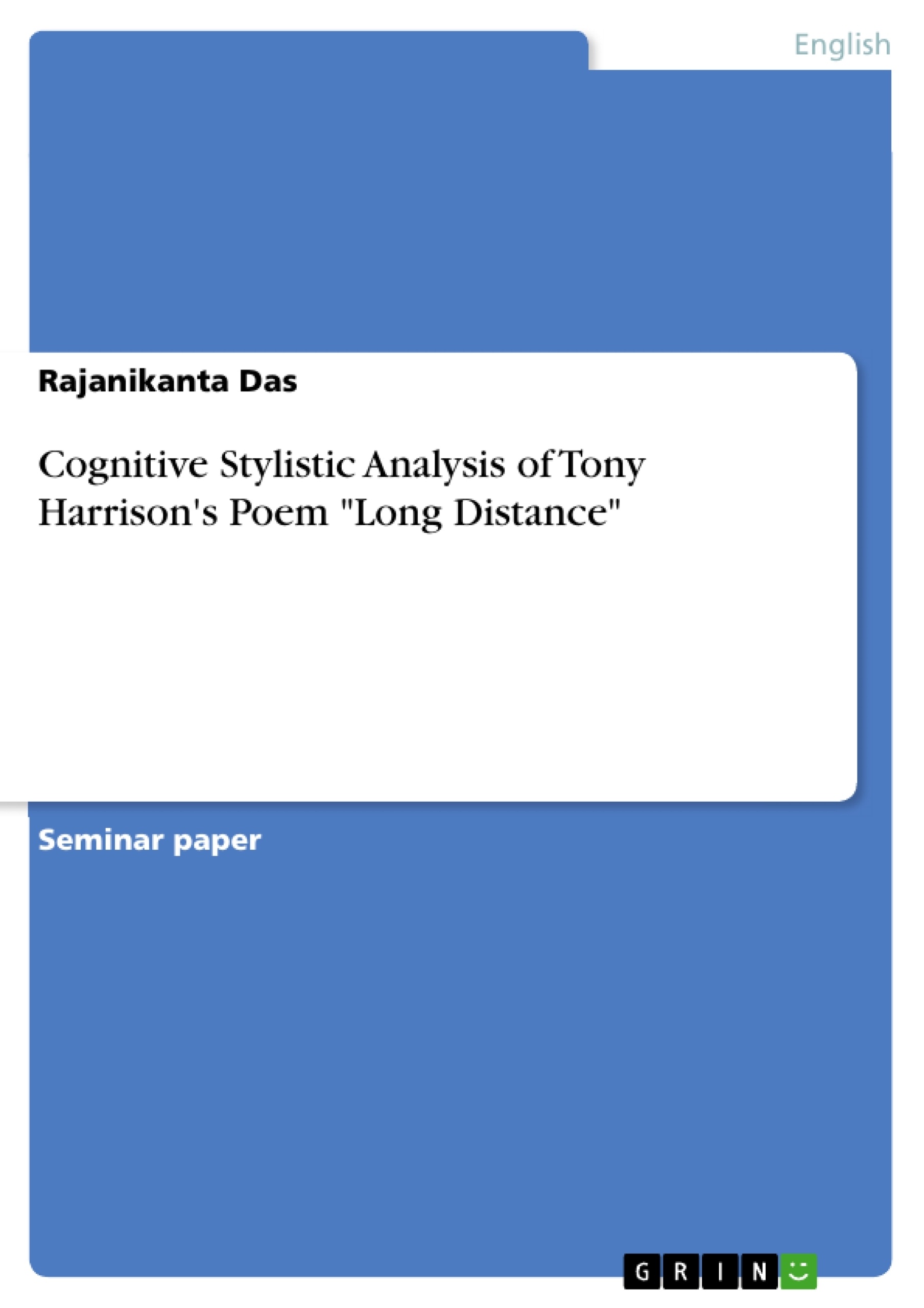
Cognitive Stylistic Analysis of Tony Harrison's Poem "Long Distance"
Hausarbeit (Hauptseminar), 2010
7 Seiten, Note: 1,3
Leseprobe
Table of Contents
- Analysis of Tony Harrison's Long Distance
Objectives and Key Themes
The objective of this analysis is to explore the texture of Tony Harrison's poem "Long Distance," examining how its stylistic features affect the reader's experience and emotional response. The analysis focuses on how the poem's structure, language, and imagery contribute to its overall impact.
- The impact of stylistic choices on the reader's emotional engagement.
- The role of textual attractors in shaping reader attention and memory.
- The poem's structure and its contribution to the reader's experience.
- The shift in perspective and its effect on the reader's emotional connection.
- The reader's emotional investment and the "moment of payoff."
Chapter Summaries
Analysis of Tony Harrison's Long Distance: This analysis delves into Tony Harrison's poem "Long Distance," focusing on how its stylistic elements influence the reader's emotional response. The study meticulously examines the poem stanza by stanza, highlighting the impact of linguistic choices such as word placement, active voice, and the use of concrete versus abstract nouns. The analysis uses Stockwell's concepts of empathetic recognizability, activeness, and textual attractors to explain the poem's effect. It explores how the poem's structure, characterized by a symmetrical form and consistent rhythm, initially creates a calming effect before shifting to a more emotionally intense experience with the introduction of the first-person narrator. The analysis closely follows the reader's journey through the poem, detailing how their attention and emotional investment are manipulated through specific stylistic choices, culminating in a powerful "moment of payoff" where the reader discovers the full implications of the poem's events. The analysis concludes by considering the personal and emotional impact of the poem, noting the sympathy evoked for both the father and son within the narrative. The analysis emphasizes the interplay between linguistic features and the reader’s emotional and cognitive processes, demonstrating how subtle stylistic choices significantly contribute to the overall impact and meaning of the poem.
Keywords
Cognitive stylistics, Tony Harrison, Long Distance, reader response, textual attractors, stylistic analysis, emotional engagement, poetic structure, narrative perspective, empathetic recognizability, activeness.
Frequently Asked Questions: Analysis of Tony Harrison's "Long Distance"
What is the purpose of this analysis?
This analysis explores the stylistic features of Tony Harrison's poem "Long Distance" and how these features affect the reader's emotional response and experience. It examines the poem's structure, language, and imagery to understand its overall impact.
What are the key themes explored in the analysis?
The analysis focuses on the impact of stylistic choices on reader engagement, the role of textual attractors in shaping reader attention and memory, the poem's structure and its contribution to the reader's experience, the shift in perspective and its emotional effect, and the reader's emotional investment leading to a "moment of payoff."
What aspects of the poem are analyzed in detail?
The analysis meticulously examines the poem stanza by stanza, focusing on linguistic choices such as word placement, active voice, and the use of concrete versus abstract nouns. It uses Stockwell's concepts of empathetic recognizability, activeness, and textual attractors to explain the poem's effect.
How does the poem's structure contribute to the reader's experience?
The analysis highlights how the poem's symmetrical form and consistent rhythm initially create a calming effect, which then shifts to a more emotionally intense experience with the introduction of the first-person narrator.
How does the analysis track the reader's emotional journey?
The analysis closely follows the reader's experience throughout the poem, detailing how their attention and emotional investment are manipulated through specific stylistic choices, culminating in a powerful "moment of payoff" where the full implications of the poem's events are revealed.
What is the overall conclusion of the analysis?
The analysis concludes by considering the poem's personal and emotional impact, noting the sympathy evoked for both the father and son. It emphasizes the interplay between linguistic features and the reader’s emotional and cognitive processes, demonstrating how subtle stylistic choices significantly contribute to the overall meaning and impact of the poem.
What are the keywords associated with this analysis?
Cognitive stylistics, Tony Harrison, Long Distance, reader response, textual attractors, stylistic analysis, emotional engagement, poetic structure, narrative perspective, empathetic recognizability, activeness.
What is included in this language preview?
This preview provides the title, table of contents, objectives and key themes, chapter summaries, and keywords of the complete analysis.
Details
- Titel
- Cognitive Stylistic Analysis of Tony Harrison's Poem "Long Distance"
- Hochschule
- Ruhr-Universität Bochum (Englisches Seminar)
- Note
- 1,3
- Autor
- Rajanikanta Das (Autor:in)
- Erscheinungsjahr
- 2010
- Seiten
- 7
- Katalognummer
- V197112
- ISBN (eBook)
- 9783656233992
- Dateigröße
- 362 KB
- Sprache
- Englisch
- Schlagworte
- cognitive stylistic analysis tony harrison poem long distance
- Produktsicherheit
- GRIN Publishing GmbH
- Preis (Ebook)
- US$ 6,99
- Arbeit zitieren
- Rajanikanta Das (Autor:in), 2010, Cognitive Stylistic Analysis of Tony Harrison's Poem "Long Distance", München, Page::Imprint:: GRINVerlagOHG, https://www.diplomarbeiten24.de/document/197112
- Autor werden
- Ihre Optionen
- Vertriebskanäle
- Premium Services
- Autorenprofil
- Textarten und Formate
- Services für Verlage, Hochschulen, Unternehmen

- © GRIN Publishing GmbH.
- Alle Inhalte urheberrechtlich geschützt. Kopieren und verbreiten untersagt.
- info@grin.com
- AGB
- Open Publishing
Der GRIN Verlag hat sich seit 1998 auf die Veröffentlichung akademischer eBooks und Bücher spezialisiert. Der GRIN Verlag steht damit als erstes Unternehmen für User Generated Quality Content. Die Verlagsseiten GRIN.com, Hausarbeiten.de und Diplomarbeiten24 bieten für Hochschullehrer, Absolventen und Studenten die ideale Plattform, wissenschaftliche Texte wie Hausarbeiten, Referate, Bachelorarbeiten, Masterarbeiten, Diplomarbeiten, Dissertationen und wissenschaftliche Aufsätze einem breiten Publikum zu präsentieren.
Kostenfreie Veröffentlichung: Hausarbeit, Bachelorarbeit, Diplomarbeit, Dissertation, Masterarbeit, Interpretation oder Referat jetzt veröffentlichen!
- GRIN Verlag GmbH
-
- Nymphenburger Str. 86
- 80636
- Munich, Deutschland
- +49 89-550559-0
- +49 89-550559-10
- info@grin.com
-









